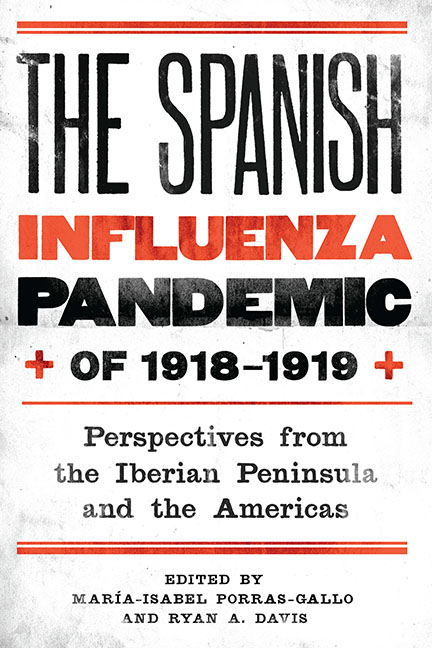 The Spanish Influenza Pandemic of 1918–1919
The Spanish Influenza Pandemic of 1918–1919 Book contents
- Frontmatter
- Dedication
- Contents
- Introduction: Emerging Perspectives of the Spanish Influenza Pandemic of 1918–19
- Part One Scientific Discourse: Now and Then
- Part Two Social Responses: Human and Institutional Actors
- Part Three Interpreting the Epidemic: Sociocultural Dynamics and Perspectives
- 9 A Tale of Two Spains: Narrating the Nation during the 1918–19 Influenza Epidemic
- 10 The Spanish Flu in Argentina: An Alarming Hostage
- 11 Epidemic Disease, Local Government, and Social Control: The Example of the City of Alicante, Spain
- 12 The Gendered Dimensions of Epidemic Disease: Influenza in Montreal, Canada, 1918–20
- 13 Remembering and Reconstructing: Fictions of the 1918–19 Influenza Pandemic
- Selected Bibliography
- List of Contributors
- Index
11 - Epidemic Disease, Local Government, and Social Control: The Example of the City of Alicante, Spain
from Part Three - Interpreting the Epidemic: Sociocultural Dynamics and Perspectives
Published online by Cambridge University Press: 14 March 2018
- Frontmatter
- Dedication
- Contents
- Introduction: Emerging Perspectives of the Spanish Influenza Pandemic of 1918–19
- Part One Scientific Discourse: Now and Then
- Part Two Social Responses: Human and Institutional Actors
- Part Three Interpreting the Epidemic: Sociocultural Dynamics and Perspectives
- 9 A Tale of Two Spains: Narrating the Nation during the 1918–19 Influenza Epidemic
- 10 The Spanish Flu in Argentina: An Alarming Hostage
- 11 Epidemic Disease, Local Government, and Social Control: The Example of the City of Alicante, Spain
- 12 The Gendered Dimensions of Epidemic Disease: Influenza in Montreal, Canada, 1918–20
- 13 Remembering and Reconstructing: Fictions of the 1918–19 Influenza Pandemic
- Selected Bibliography
- List of Contributors
- Index
Summary
Throughout history, urban societies, the social structures that form them, and their capacity for reaction have been called into question as a result of periodic mortality crises caused by infectious diseases of epidemic proportions. In the contemporary age alone, the European Mediterranean area has suffered outbreaks of yellow fever and cholera in the nineteenth century and an epidemic of influenza in 1918–19. Infectious processes of this kind usually cause intense and complex reactions due to the health-related, social, economic, political, and demographic consequences that they bring. Terror, panic, instinctive selfishness, a moral explanation of the disease analyzed in terms of guilt and innocence, the call for measures to exclude or isolate those affected, and the search for scapegoats are just some of the collective reactions that have emerged in different periods of history whenever a society has been threatened by an epidemic.
Society's attitudes to the sick and the value placed on health and illness have varied throughout history, but what has remained constant is the social isolation that victims of a disease have been subjected to, particularly during an epidemic. The sudden and spectacular way in which epidemics tend to start, the way their incidence increases, the large number of deaths they cause, and the numbers of people affected underlie such significant social aggressiveness.
But despite the fact that epidemic diseases do not tend to make any distinction between social groups or classes, their repercussions tend to be greater in sectors of society where poverty and a lack of resources make people far more vulnerable. Not only are victims isolated, but various health, social, and political control processes are usually implemented that affect the most socioeconomically disadvantaged members of the population, those who are often thought to be the cause of the disease or responsible for it spreading. Given that the social class to which one belongs greatly impacts the differential risk of falling ill, it is feasible that this realization would therefore have influenced the development and implementation of instruments of control by ruling classes throughout history to benefit themselves and their interests. In reality, many of these considerations may be valid for any episode of disease, but historical evidence shows that it is during an epidemic when the greatest mechanisms of control have arisen.
- Type
- Chapter
- Information
- The Spanish Influenza Pandemic of 1918–1919Perspectives from the Iberian Peninsula and the Americas, pp. 215 - 229Publisher: Boydell & BrewerPrint publication year: 2014


